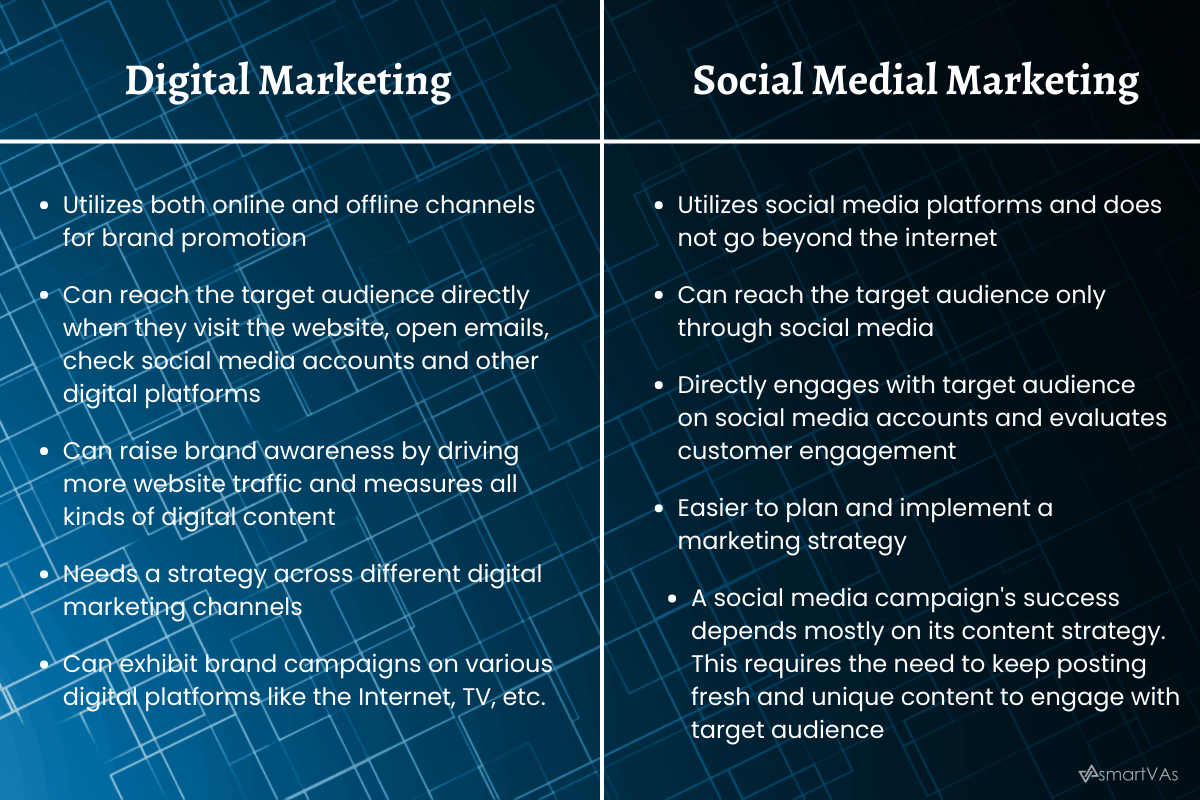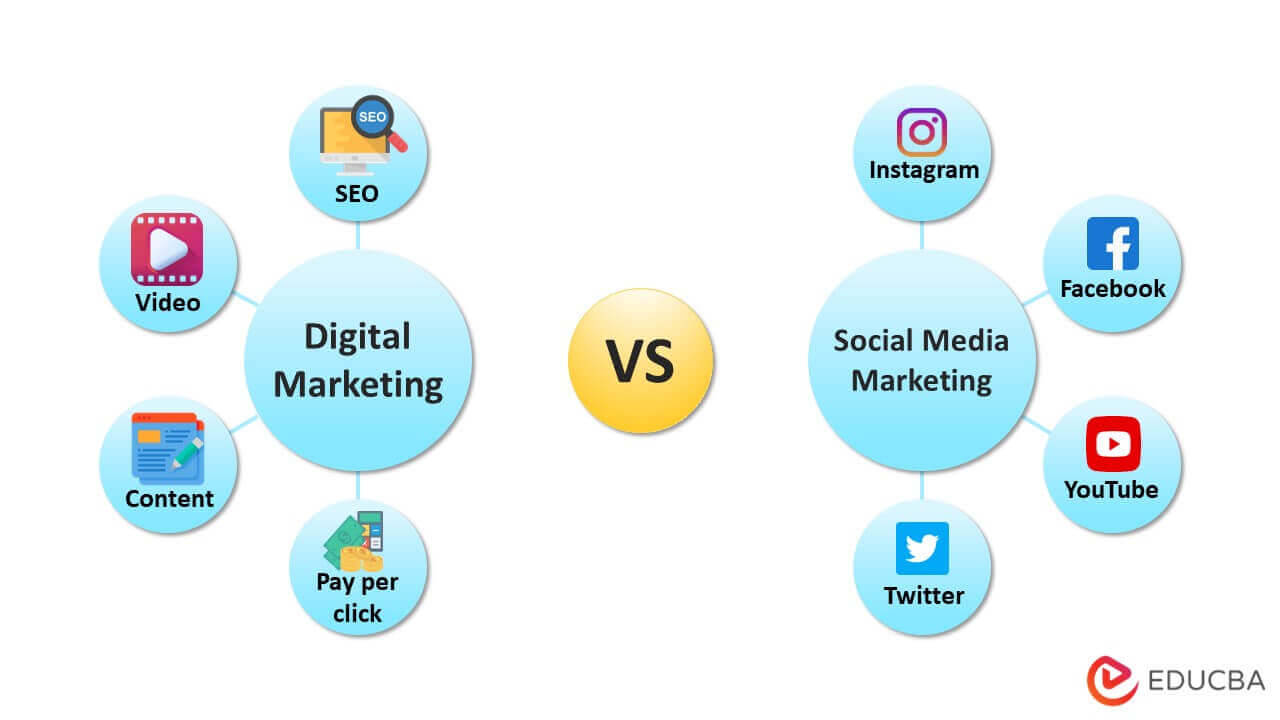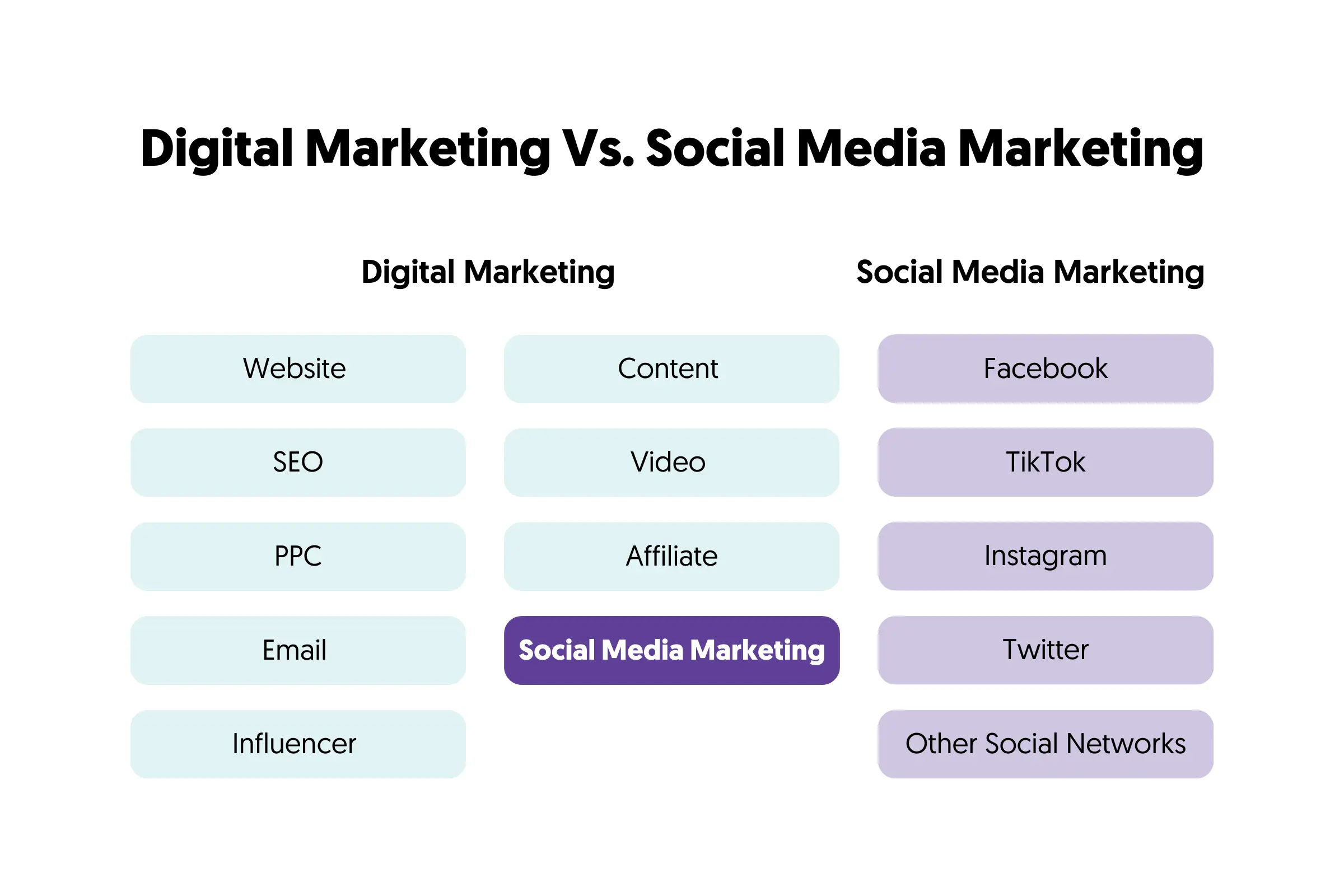Digital marketing encompasses all online marketing efforts, including SEO, email, and paid ads, while social media marketing focuses solely on promoting content through social media platforms.
Both play key roles in modern business strategies but serve different functions. Digital marketing covers all online marketing efforts. It includes SEO, email marketing, content marketing, and more. Social media marketing focuses solely on social platforms like Facebook, Instagram, and Twitter.
Understanding the difference helps businesses allocate resources effectively. It ensures they reach their target audience in the most efficient way. Exploring these distinctions can reveal which strategy best suits your needs. This guide will clarify each approach, helping you make informed decisions. Stay tuned as we break down these marketing methods.
Core Components
The core components of digital marketing and social media marketing define their unique strategies. Understanding these elements helps businesses choose the right approach. Let’s explore the essential parts of each to see their differences.
Digital Marketing Elements
Digital marketing includes a wide range of online activities. These elements work together to create a comprehensive strategy.
One key component is search engine optimization (SEO). This helps websites rank higher on search engines. Paid advertising, such as pay-per-click (PPC), drives traffic to websites quickly. Email marketing keeps customers engaged with personalized messages.
Content marketing is another vital element. It involves creating valuable content to attract and retain an audience. Website analytics track and measure the effectiveness of these strategies. This helps businesses make data-driven decisions.
Social Media Marketing Elements
Social media marketing focuses on promoting brands through social platforms. This includes creating and sharing content on social networks.
Content creation is a primary component. It involves crafting engaging posts, images, and videos. Social media advertising targets specific audiences with paid campaigns. Influencer marketing leverages the reach of popular personalities.
Community management is crucial. It involves interacting with followers and responding to comments. Analytics and reporting track performance. This helps refine strategies for better results.

Credit: smartvirtualassistants.com
Key Strategies
Understanding the key strategies in digital marketing and social media marketing is essential. Each has unique methods to reach and engage your audience effectively.
Effective Digital Marketing Strategies
One key strategy in digital marketing is search engine optimization (SEO). SEO helps improve your website’s visibility on search engines. This draws more organic traffic to your site.
Another essential strategy is content marketing. Creating valuable content attracts and retains a clearly defined audience. This can include blog posts, videos, and infographics.
Email marketing remains a powerful tool. Sending personalized emails helps build strong relationships with your customers. It keeps them informed about your products or services.
Pay-per-click (PPC) advertising is another important strategy. PPC ads appear on search engines and social media platforms. You pay only when someone clicks on your ad.
Successful Social Media Marketing Strategies
Creating engaging content is crucial in social media marketing. This content should resonate with your audience. It can be images, videos, or interactive posts.
Consistency is key on social media. Posting regularly keeps your audience engaged. It helps maintain a strong online presence.
Influencer partnerships can boost your brand’s visibility. Collaborating with influencers helps reach a broader audience. It builds trust and credibility for your brand.
Using social media ads can also be effective. These ads target specific demographics. This ensures your message reaches the right audience.
Tools And Platforms
Tools and Platforms play a crucial role in both digital marketing and social media marketing. Understanding the different tools and platforms can help businesses choose the best strategies for their marketing campaigns. Below, we explore the digital marketing tools and social media platforms that are essential for effective marketing.
Digital Marketing Tools
Digital marketing relies on a variety of tools to reach and engage customers. These tools help in creating, managing, and analyzing marketing campaigns.
| Tool | Purpose |
|---|---|
| Google Analytics | Tracks website traffic and user behavior |
| Mailchimp | Manages email marketing campaigns |
| SEMrush | Conducts SEO research and competitor analysis |
| HubSpot | Automates marketing processes |
These tools help in optimizing websites, running email marketing campaigns, and analyzing data. Google Analytics is essential for understanding website performance. Mailchimp simplifies the email marketing process. SEMrush is great for SEO research, while HubSpot aids in marketing automation.
Social Media Platforms
Social media marketing focuses on using social media platforms to promote products and services. Different platforms offer unique ways to reach and engage with an audience.
- Facebook: Popular for its vast user base and advertising options.
- Instagram: Ideal for visual content and engaging younger audiences.
- Twitter: Great for real-time engagement and customer service.
- LinkedIn: Best for B2B marketing and professional networking.
- Pinterest: Useful for visual inspiration and driving traffic to websites.
Each platform has unique features and audiences. Facebook is versatile and effective for detailed targeting. Instagram excels with visual content. Twitter is perfect for quick updates and interactions. LinkedIn connects professionals, and Pinterest drives traffic through visual pins.

Credit: www.educba.com
Target Audience
Understanding the target audience is crucial in both digital and social media marketing. It helps tailor the message and reach the right people effectively. While both strategies aim to connect with specific groups, their approaches and platforms differ. This section explores how each strategy targets and engages audiences.
Reaching Your Audience Digitally
Digital marketing uses various channels to reach a wide audience. These channels include email, search engines, and websites. Digital marketers analyze data to identify potential customers. They create personalized content based on user behavior and preferences.
Pay-per-click (PPC) advertising targets users through search engines. It shows ads based on search terms. Content marketing involves creating valuable articles or videos. These attract users looking for information or solutions. Email marketing targets subscribers with tailored messages. It builds long-term relationships with customers.
Engaging With Social Media Users
Social media marketing focuses on platforms like Facebook, Instagram, and Twitter. These platforms connect businesses with users in a more interactive way. Social media marketers create engaging posts to capture attention. They use visuals, stories, and live videos to keep users interested.
Targeting on social media involves understanding user demographics and interests. Marketers use social media analytics to track engagement. They adjust their strategies based on what works. Social media ads can target users by age, location, and interests. This precise targeting helps reach the right audience.
Measurement And Analytics
Understanding measurement and analytics is crucial in distinguishing between digital marketing and social media marketing. Both fields rely on data to track performance, but the metrics and tools they use differ significantly.
Digital Marketing Metrics
Digital marketing encompasses a broad range of online activities. Each activity has specific metrics for measuring success.
- Website Traffic: The number of visitors to your site.
- Conversion Rate: The percentage of visitors who take a desired action.
- Click-Through Rate (CTR): The ratio of users who click on an ad to the number who view it.
- Cost Per Acquisition (CPA): The cost to acquire a customer through a campaign.
- Return on Investment (ROI): The profit made from marketing efforts divided by the cost.
These metrics help marketers understand the overall performance of their campaigns. They provide insights into areas like search engine optimization (SEO), email marketing, and pay-per-click (PPC) advertising.
Social Media Analytics
Social media marketing focuses on platforms like Facebook, Instagram, and Twitter. Each platform offers unique analytics tools.
- Engagement Rate: The level of interaction (likes, shares, comments) with your content.
- Follower Growth: The increase in the number of followers over time.
- Impressions: The number of times your content is displayed.
- Reach: The number of unique users who see your content.
- Social Share of Voice (SOV): The percentage of mentions your brand has compared to competitors.
These metrics are key for assessing the effectiveness of social media strategies. They highlight how well the audience engages with your brand and content.
| Metric | Digital Marketing | Social Media Marketing |
|---|---|---|
| Traffic | Website visitors | Post reach |
| Conversion | Sales, sign-ups | Likes, shares |
| Cost | CPA, ROI | Ad spend |
| Engagement | Click-through rate | Engagement rate |
Both digital marketing and social media marketing use data for decision-making. Each has its own set of metrics that align with its specific goals.
Costs And Budgeting
Costs and budgeting play a crucial role in marketing strategies. Understanding the financial aspects helps businesses allocate resources efficiently. Knowing the difference in costs between digital marketing and social media marketing can guide budget decisions.
Budgeting For Digital Marketing
Digital marketing covers a wide range of tactics. These include SEO, email campaigns, PPC, and content marketing. Budgeting for digital marketing requires considering these various channels. Each channel has different costs and potential returns.
For instance, PPC campaigns might need a significant budget. SEO, on the other hand, often requires ongoing investment. Email marketing might be less expensive but needs quality content. Businesses must analyze which channels align with their goals and budget accordingly.
Costs Of Social Media Marketing
Social media marketing focuses on platforms like Facebook, Instagram, and Twitter. The costs here can be more flexible. Paid ads on social media vary based on audience targeting and ad types.
Organic social media marketing often involves time rather than money. Creating engaging content regularly can attract followers without paid ads. Yet, investing in tools to schedule posts or analyze performance might be necessary.
Influencer partnerships are another cost factor. Collaborating with influencers can boost reach but come with different price tags. It’s important to weigh these costs against the potential engagement and conversions.
Future Trends
The world of marketing is evolving rapidly. Staying updated with future trends is essential. Digital marketing and social media marketing are no exceptions. Both fields are seeing incredible advancements. Let’s explore what the future holds for each.
Emerging Trends In Digital Marketing
Digital marketing is broad and covers many areas. It includes search engine optimization (SEO), email marketing, content marketing, and more. New trends are emerging that will shape the future.
- Artificial Intelligence (AI): AI is transforming marketing. It helps with data analysis and customer insights.
- Voice Search Optimization: More people use voice assistants. Optimizing for voice search is crucial.
- Video Marketing: Videos engage users. They are powerful tools for storytelling and education.
- Personalization: Tailored content makes marketing more effective. Personalization improves user experience.
These trends will redefine digital marketing. Staying ahead of these changes is key.
Future Of Social Media Marketing
Social media marketing focuses on platforms like Facebook, Instagram, and Twitter. Its future looks promising with several emerging trends.
- Influencer Marketing: Influencers have a strong impact. Partnering with them can boost brand visibility.
- Social Commerce: Shopping directly on social platforms is growing. It makes the buying process seamless.
- Ephemeral Content: Stories and temporary posts engage users. They create a sense of urgency.
- Augmented Reality (AR): AR enhances user interaction. It offers immersive experiences.
Social media marketing will continue to evolve. Embracing these trends can lead to success.

Credit: www.reliablesoft.net
Frequently Asked Questions
What Is Digital Marketing?
Digital marketing encompasses all online marketing efforts. It involves using digital channels like search engines, websites, and email to promote products or services.
How Does Social Media Marketing Work?
Social media marketing involves using social media platforms to connect with your audience. It helps to build brand awareness, drive traffic, and increase sales.
Are Digital And Social Media Marketing The Same?
No, they are not the same. Digital marketing includes all online marketing strategies, while social media marketing focuses specifically on social media platforms.
What Are The Benefits Of Digital Marketing?
Digital marketing offers broader reach, better targeting, and measurable results. It allows businesses to engage with customers in real-time and adapt strategies quickly.
Conclusion
Digital marketing and social media marketing both play crucial roles. Digital marketing covers a broader scope. It includes SEO, email, PPC, and more. Social media marketing focuses on platforms like Facebook, Instagram, and Twitter. Each has unique benefits. Understanding these differences helps in planning better strategies.
Choose the right mix for your business goals. Stay updated with trends. This ensures effective marketing efforts. Engage your audience effectively. Boost your online presence. Make informed decisions. Get the best results from your marketing efforts.

